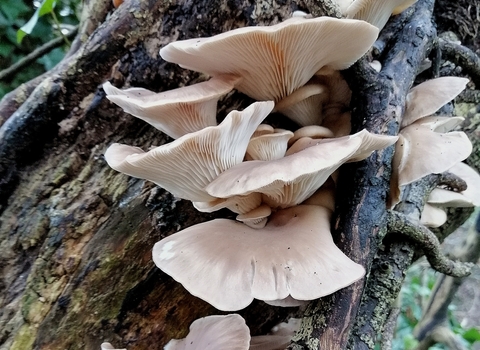
Ali Mckernan
Oyster mushroom
Oyster mushrooms are shell shaped fungi that grow in tiers or fabulous clusters on dead trees or stumps. Unlike many fungi, these mushrooms are not seasonal and can be found all year round, especially after a cold snap which can trigger the fungus into fruiting.
Scientific name
Pleurotus ostreatusWhen to see
All year roundSpecies information
Category
Statistics
Average cap diameter: 5 - 15cm (occasionally even larger)Average stem length: 1 - 4cm
Common
Habitats
About
These beautiful shell like mushrooms grow horizontally out of the dead and dying wood of deciduous trees, especially beech. They are a saprobe, which means they live off decaying organic matter, and are specialists in breaking down some of nature's toughest materials - cellulose and lignin. In the process, they release vital nutrients back into the ecosystem.How to identify
This oyster starts out a beautiful grey blue colour with a cap edge that rolls slightly inward, gradually opening out turning grey brown and wavy with age. Look underneath, and you'll find they have crowded whitish gills that are decurrent - meaning they run right from the cap edge and down the stem. In this case, the stem is rudimentary, a short (often fluffy) number that's only a few centimetres long.A handful of other oyster mushrooms exist, but are often much paler in colour. If they're much smaller, they're likely to be the oysterling family. A similar, all white version known as angel's wings is a great find as it's quite rare (and poisonous)!
